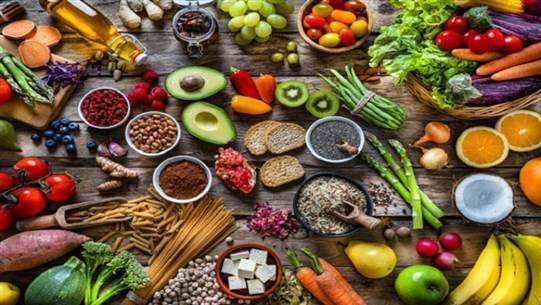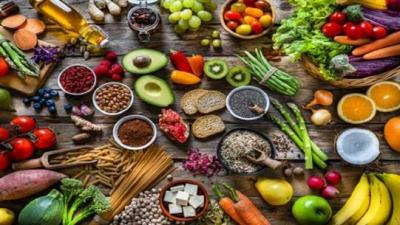We know we should eat a healthy and balanced diet, but considering age, some foods may be more necessary than others. To achieve health benefits from diet, nutritionist Amanda Orsell explains what should be consumed at each stage of life.
**In Your Twenties**
- **Daily:** Iron-rich foods for energy
Beneficial iron-rich foods include peas, cooked beans, peanuts, dried apricots, eggs, fortified cereals, and fish like mackerel. A dietary survey shows that iron deficiency, leading to fatigue, stress, poor concentration, and moodiness, is a major concern for teenage girls and those in their twenties. It is essential to address this as soon as possible.
- **Three times a week:** Probiotic yogurt for gut health
Eating yogurt containing probiotics (beneficial live bacteria) can improve gut health, which in turn can aid immunity and mood. It is also high in calcium, needed to strengthen bones.
- **Once a week:** Brazil nuts for immunity
A good handful of these nuts provides the selenium you need. This compound is also found in chicken, fish, eggs, and seeds. Selenium deficiency makes you more susceptible to viral infections that cause colds, flu, and possibly COVID-19.
**In Your Thirties**
- **Daily:** Vegetables for healthy pregnancy
Green vegetables like kale and spinach, along with legumes, oranges, berries, and nuts, provide folate, a vital B vitamin for developing babies' nervous systems in the first eight weeks of pregnancy. Health experts recommend taking 400 micrograms of folic acid daily.
- **Three times a week:** Almonds as an anti-aging food
Sun damage affects our skin, leading to wrinkles. Nuts and seeds provide vitamin E, which helps combat general oxidative damage in our bodies, including our skin. Avocados, whole grains, and spinach also supply this vital anti-aging vitamin.
- **Once a week:** Decaf coffee and tea for better sleep
Start giving your body a break from caffeine once a week, as caffeine stimulates your nervous system and can disrupt sleep for up to eight hours after consumption. Begin reducing caffeine to once a week to pave the way for healthier sleep patterns.
**In Your Forties**
- **Daily:** Slow-release carbohydrates for energy balance
Oatmeal, pasta, sweet potatoes, along with fruits and vegetables, provide these slow-release carbohydrates to help stabilize energy as women's hormones begin to change. They also prevent sugar spikes from fast-release carbohydrates that damage collagen in our skin.
- **Three times a week:** Plant-based estrogen for menopause
Soy, legumes, and whole grains provide phytoestrogens, which experts suggest can help women during menopause with a weak estrogen-like effect.
- **Once a week:** Kimchi for bone health
Kimchi, a traditional Korean dish similar to pickles, includes fermented cabbage, yogurt, lean red meats, and dairy, giving us a form of vitamin K, which is vital for bones that can become weaker and more prone to fractures in our forties.
**In Your Fifties**
- **Daily:** Tomatoes to fight wrinkles
Tomatoes, along with broccoli, spinach, red peppers, carrots, and kale, are excellent sources of red, yellow, and orange antioxidants called lycopene, lutein, and beta-carotene. Dermatologists have shown that regular consumption can help protect our skin from aging from the inside out.
- **Three times a week:** Berries for brain protection
Mix 100g of frozen berries with milk or fortified plant milk. Berries are especially rich in supernutrient flavonoids, which research suggests may help reduce the risk of dementia.
- **Once a week:** Oily fish for blood pressure
Sardines and salmon provide essential omega-3 fats, important for helping control blood pressure and overall heart health. If you don't eat fish, try plant sources including walnuts and chia seeds.
**In Your Sixties**
- **Daily:** Protein-rich foods to strengthen muscles
Whether plant-based, from legumes, nuts, and seeds, or animal-based, from chicken, fish, or lean meats, protein-rich foods are crucial to help reduce muscle wasting, or sarcopenia, which can increase the risk of falls. Fifteen percent of those over 65 and half of those over 80 are affected by this condition, making protein a priority in every meal.
- **Three times a week:** Eggs for memory
Eggs are beneficial for choline, a vital nutrient for creating the neurotransmitter acetylcholine, which helps muscles contract and plays a crucial role in memory and thinking. Chicken, fish, beans, nuts, seeds, and whole grains are also essential sources of choline.
- **Once a week:** Turmeric to combat inflammation
One promising study indicates that turmeric supplements may help relieve symptoms of osteoarthritis in the knees. While the study was small and short-term, it supports turmeric's anti-inflammatory properties. Turmeric can be included in dishes and beverages once a week and increased gradually.
**In Your Seventies and Beyond**
- **Daily:** Drinks to reduce stress and confusion
Our thirst mechanism is less accurate as we age, putting us at risk for dehydration. Reduced fluid intake can lead to stress, confusion, and fatigue. Therefore, continue to drink fluids throughout the day, including milk, tea, coffee, fruit juice, and water.
- **Three times a week:** Healthy oils for heart health
Olive oil and rapeseed oil are good for cooking and salad dressings. Packed with healthy fats, they are heart-friendly and calorie-rich, which is important if your appetite begins to decline.
- **Once a week:** Mackerel for hearing protection
Consuming foods high in vitamin D is essential for our bodies to absorb calcium, which is vital for overall bone health, including the three small bones in our middle ear that play a key role in hearing. A dietary supplement containing 10 micrograms of vitamin D daily is also recommended.




